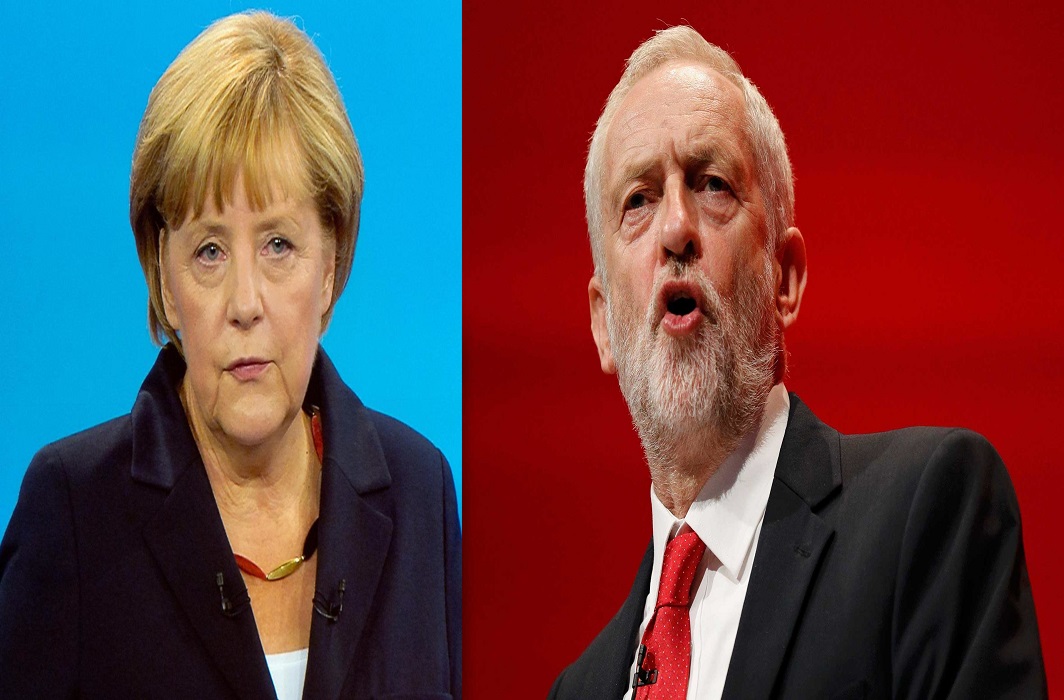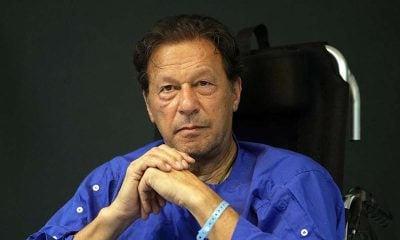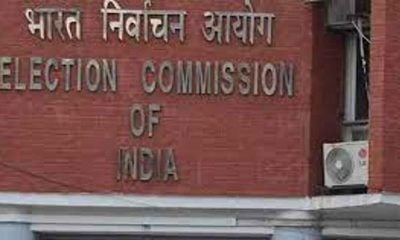~By Saeed Naqvi
Two developments in Europe this week have brought cheer. First, Angela Merkel has held onto her job (even though only by the skin of her teeth). Secondly, the very citadel of western capitalism, The Economist, has editorially welcomed Jeremy Corbyn, a socialist in the Michael Foot mould, as Britain’s next Prime Minister, whenever elections take place. There is a stamp size photograph of Corbyn standing at 10 Downing Street, without a neck tie, of course.
It is maliciously reported that smoke billowed out of Lord Peter Mandelson’s ears after he read the editorial while holidaying on an oligarch’s yacht. Tony Blair’s favourite sidekick and one of the architects of the now defunct New Labour, had sworn in 2015, that he would work hard to “undermine Corbyn”.
It is not that The Economist has suddenly turned pink. It is doing the best it can to cope with altered circumstances: if you can’t beat them, join them.
The trophy for prescience must go to Chris Mullin, writer and former Labour MP. In 2015, Mullin wrote an imaginary piece in The Guardian under the heading:
“All hail the Bearded One! The first 100 days of Jeremy Corbyn as Prime Minister”.
“To general astonishment, among the early visitors to Downing Street is a grim-faced Rupert Murdoch. He is closeted with the new prime minister for more than an hour, at the end of which the following announcement is made.”
“First, that the Broadcasting Acts are amended, requiring Sky to compete on a level playing field with the main terrestrial TV channels. And secondly, that he relinquishes control of all his British newspapers which will, in future, be managed by a trust in which no single shareholder will have a controlling interest. Mr. Murdoch has accepted these conditions. Our discussions were amicable.”
While Corbyn is still in the realm of speculation, the historic German elections have stirred up the heart of Europe. From the wreckage around her, emerges Angela Merkel as a fourth term German Chancellor, testimony to the compelling power of decency in public life. If she were not a hardnosed politician also she would not be where she is – a titanic figure in world affairs. But a premium she places on moral and ethical values in decision making, shines through. This fourth term is her trophy on that count.
Daughter of a vicar in East Germany, her background has been something of an asset for her. It is the abiding Christian in her, in the highest sense of the term, that enabled her to rise above the din and keep compassion as an ingredient in her decision to accord hospitality to hapless Arab and North Africa migrants – totally against the prevailing political current.
She is too intuitive not to have known that she would be made to pay a price for her decision. As a consequence, the Bundestag will have for the first the ultra right wing AFD (Alternative for Germany) with 94 seats, making it the country’s third largest party much of it at Merkel’s cost. Marine Le Pen in France or Geet Wilder in the Netherlands also represent narrow, anti immigrant Xenophobia. In Germany the AFD resonates more frightfully. It stirs images of Nazism. But it would be a mistake to paint all the one million voters who moved away from the ruling Christian Democrats, with the same brush.
Let me add in parenthesis: voters moved away from CDU and its Bavarian partner, CSU, but, please note, much the largest number of the vote did not shift. They stayed with Angela Merkel. It must be put down to Merkel magic that in a House of 709, she still has 246 seats despite her immigration policy. But she is still 109 short of a majority. “One thing is clear” she announced with good natured mischief in her eyes. “They can’t form a government without us.”
By the same token, she cannot form a government without them. The Social Democrats who were with her in a grand coalition in the outgoing government, have been decimated. They have decided to sit in the opposition.
If Merkel lost 8.5% of her vote because of her calculated decency, Martin Schulz of SPD is kicking himself for having lost 5.2% of his vote for the sin of looking like CDU’s B team. The fate of the Spanish Socialist party leader Pedro Sanchez must have haunted him. After two deadlocked elections, Sanchez was persuaded to abstain from a vote, enabling the Peoples Party Prime Minister Mariano Rajoy to sail through. Sanchez now looks a cipher in public life. Schulz wishes to escape that fate. There is accidental altruism in his decision too. By choosing to be in the opposition with 153 seats, he has effectively blocked AFD from taking the pulpit as leader of the opposition.
All of Merkel’s negotiating skills will be brought into play to forge what in German parlance is called a “Jamaica” coalition – black, yellow and Green representing the colours of CDU, FDP and Green. The combination happens to be the colour of the Jamaican flag.
How will Merkel reconcile her gentler, market approach to the Liberal, FDP leader, Christian Lindner’s unbridled capitalism?
Will there be difficulty striking a rapport with the Green’s Katrin Goring-Eckardt on environmental issues? Merkel did not hesitate calling off nuclear energy for Germany quite instinctively as soon as she witnessed Japan’s Fukushima disaster.
She will also work very hard to retrieve the million or so voters who drifted away from her because of her being “soft” on immigration. A hunch on Merkel is that she will not compromise on her core beliefs. One such belief concerns immigration. Refugees fleeing from the post 9/11 West Asian wars strike a very Christian chord with her.
Being practical, she will not accelerate migration; she will facilitate migrant leaders, NGOs, in establishing model migrant settlements. Unnecessary gestures unpopular with the electorate, will be discarded. She has already spoken with her usual honesty that talks with Turkey should be suspended on European entry. Where is the point in sustaining a dialogue with Turkey when nobody in Europe is willing to give up the medieval aversion to the “Turk”. Decades ago, French President Giscard d’Estaing declared with stunning candour: “European civilization is Christian civilization”. In it there was no room for a Muslim Turkey. Those were days when Turkey’s case could be supported because it still donned the secular cloak of Ataturk. Now Europe considers such support untenable: Turkey is quite transparently, Muslim Brotherhood.


 LATEST SPORTS NEWS15 hours ago
LATEST SPORTS NEWS15 hours ago
 India News14 hours ago
India News14 hours ago
 India News15 hours ago
India News15 hours ago
 India News15 hours ago
India News15 hours ago
 Latest world news9 hours ago
Latest world news9 hours ago
 India News7 hours ago
India News7 hours ago















